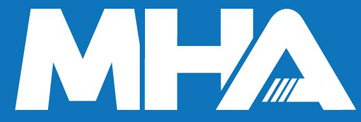Common mistakes to avoid when using Material Handling Equipment
Date Posted:14 June 2024
Effective utilization of material handling equipment is essential for safe and efficient warehouse operations. Common mistakes to avoid include ignoring safety procedures, overloading equipment, improper training, lack of maintenance, neglecting ergonomic
Material handling equipment plays a crucial role in warehouse operations, facilitating the movement and storage of goods efficiently. However, improper use of this equipment can lead to accidents, damage to goods, and loss of productivity. To ensure safe and effective handling, it's essential to avoid common mistakes. This article outlines some of these mistakes and offers tips on how to prevent them.
1. Ignoring Safety Procedures
Mistake:
Failing to follow safety procedures and guidelines when operating material handling equipment can result in accidents and injuries to workers.
Prevention:
- Ensure all operators are properly trained on equipment usage and safety protocols.
- Regularly conduct safety inspections of equipment and address any issues promptly.
- Provide and enforce the use of personal protective equipment (PPE) such as helmets, gloves, and safety goggles.
2. Overloading Equipment
Mistake:
Attempting to lift or transport loads that exceed the equipment's weight capacity can lead to equipment failure, damage to goods, and safety hazards.
Prevention:
- Know the weight capacity of the equipment and never exceed it.
- Use appropriate lifting attachments or accessories to distribute weight evenly.
- If a load is too heavy, use alternative equipment or break it down into smaller, manageable loads.
3. Improper Training
Mistake:
Inadequate training of operators can result in inefficient operation, increased risk of accidents, and damage to goods.
Prevention:
- Provide comprehensive training to all operators on the proper use of equipment, including safety procedures, operational controls, and emergency protocols.
- Conduct regular refresher training sessions to reinforce proper techniques and address any new developments in equipment usage.
4. Lack of Maintenance
Mistake:
Neglecting routine maintenance of material handling equipment can lead to breakdowns, costly repairs, and disruptions to operations.
Prevention:
- Develop a maintenance schedule and adhere to it diligently.
- Conduct regular inspections of equipment for signs of wear and damage, and address any issues promptly.
- Keep detailed records of maintenance activities, including repairs and replacements.
5. Ignoring Ergonomics
Mistake:
Neglecting ergonomic considerations when operating material handling equipment can lead to repetitive strain injuries and musculoskeletal disorders among workers.
Prevention:
- Ensure equipment is ergonomically designed to reduce strain on operators.
- Adjust equipment settings, such as handle height and tilt angle, to accommodate individual operators.
- Encourage proper lifting techniques and provide training on ergonomic practices.
6. Poor Communication
Mistake:
Failure to communicate effectively among team members when using material handling equipment can lead to accidents, collisions, and delays.
Prevention:
- Implement clear communication protocols, such as hand signals or radio communication, when operating equipment in shared spaces.
- Establish designated traffic lanes and pedestrian walkways to minimize the risk of collisions.
- Encourage open communication among team members to report hazards or concerns promptly.
7. Neglecting Environmental Factors
Mistake:
Ignoring environmental factors such as weather conditions and terrain can compromise the safe operation of material handling equipment.
Prevention:
- Consider environmental conditions, such as rain, snow, or extreme temperatures, when planning equipment usage.
- Use equipment with appropriate tires or tracks for the terrain, especially in outdoor or rough terrain environments.
- Implement additional safety measures, such as warning signs or barriers, in hazardous conditions.
Effective utilization of material handling equipment is essential for safe and efficient warehouse operations. Common mistakes to avoid include ignoring safety procedures, overloading equipment, improper training, lack of maintenance, neglecting ergonomics, poor communication, and ignoring environmental factors. By addressing these mistakes through proper training, maintenance, communication, and consideration of ergonomic and environmental factors, warehouses can minimize risks, prevent accidents, and optimize productivity.
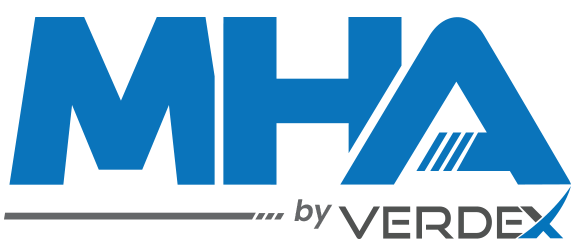

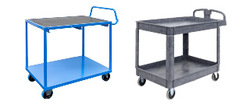
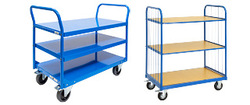
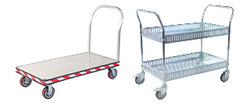
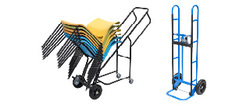
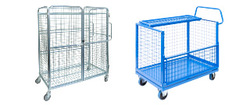
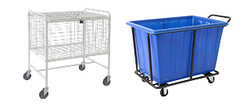
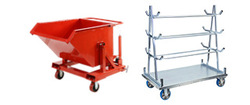
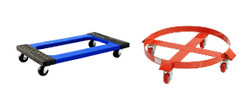
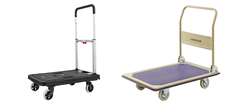
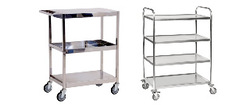
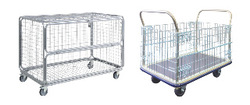
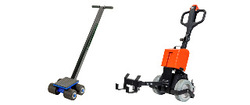
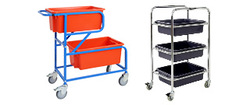
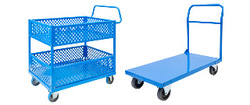
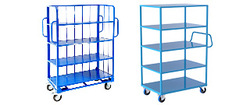
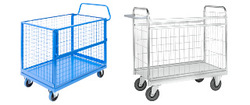
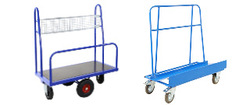
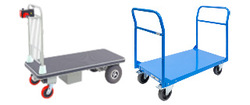
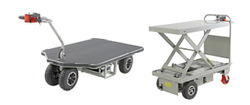
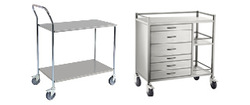
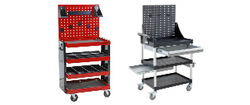
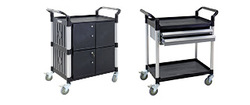
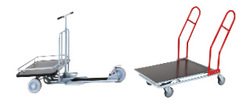
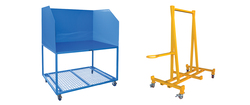



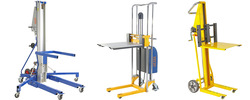



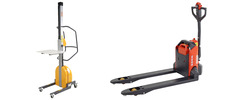
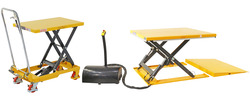
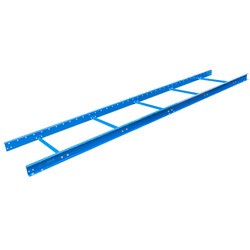
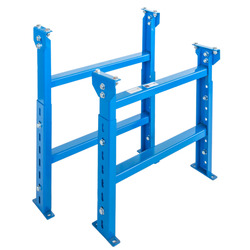
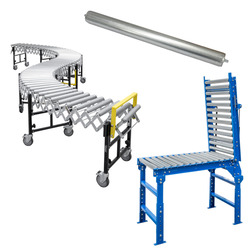
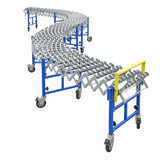



















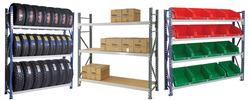
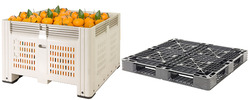
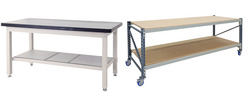
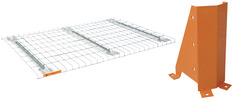
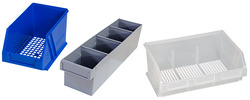

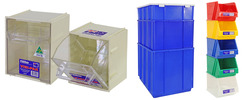

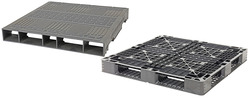

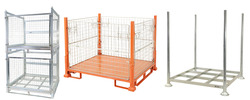
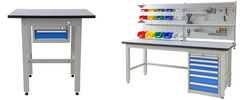
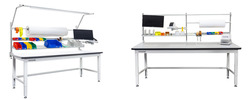

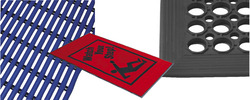
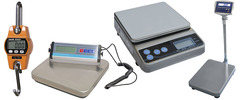



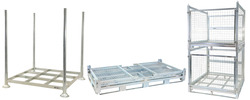
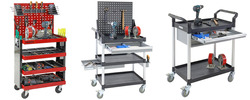
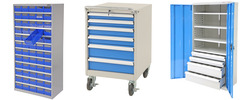

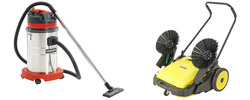





































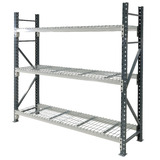















 Trolleys / Hand Trucks
Trolleys / Hand Trucks 2 Tier Trolleys
2 Tier Trolleys 3 Tier Trolleys
3 Tier Trolleys Aluminium Trolleys
Aluminium Trolleys Appliance & Hand Trucks
Appliance & Hand Trucks Cage Trolleys
Cage Trolleys Cleaning Carts & Trolleys
Cleaning Carts & Trolleys Construction Trolleys
Construction Trolleys Dollies
Dollies Foldable Trolleys
Foldable Trolleys Hospital Trolleys
Hospital Trolleys Laundry/Linen Trolleys
Laundry/Linen Trolleys Load Skates & Tow Tugs
Load Skates & Tow Tugs Mail / Office Trolleys
Mail / Office Trolleys Multi Purpose Trolleys
Multi Purpose Trolleys Multi-Tier Shelf Trolleys
Multi-Tier Shelf Trolleys Order Picking Trolleys
Order Picking Trolleys Panel Cart Trolleys
Panel Cart Trolleys Platform Trolleys
Platform Trolleys Powered Trolleys
Powered Trolleys Stainless Steel Trolleys
Stainless Steel Trolleys Tool Trolleys
Tool Trolleys Utility Carts
Utility Carts Warehouse Trolleys
Warehouse Trolleys Custom Trolleys
Custom Trolleys Lifting Equipment
Lifting Equipment Forklift Attachments
Forklift Attachments Jib Attachments
Jib Attachments Lifting Hoists & Pallet Hooks
Lifting Hoists & Pallet Hooks Manual Stackers & Lifters
Manual Stackers & Lifters Pallet Jacks
Pallet Jacks Pallet Lifters
Pallet Lifters Pallet Rotators & Dispenser
Pallet Rotators & Dispenser Powered Pallet Trucks & Electric Lifters
Powered Pallet Trucks & Electric Lifters Scissor Lift Trolleys and Tables
Scissor Lift Trolleys and Tables Conveyor Equipment
Conveyor Equipment Conveyor Frames
Conveyor Frames Conveyor Stands
Conveyor Stands Roller Conveyors
Roller Conveyors Skate Wheel Conveyors
Skate Wheel Conveyors Access Equipment
Access Equipment Container & Yard Ramps
Container & Yard Ramps Step Stools & Ladders
Step Stools & Ladders Work Platforms & Crane Cages
Work Platforms & Crane Cages Drum Handling
Drum Handling Drum Storage & Bunding
Drum Storage & Bunding Drum Trolleys & Lifters
Drum Trolleys & Lifters Forklift Drum Handling
Forklift Drum Handling Containment & Spillage
Containment & Spillage Aerosol Cans Storage Cages
Aerosol Cans Storage Cages Bunded Pallets & Storage
Bunded Pallets & Storage Corrosive Goods Storage Cabinets
Corrosive Goods Storage Cabinets Flammable Liquid Cabinets
Flammable Liquid Cabinets Forklift Gas Storage Cages
Forklift Gas Storage Cages Gas Cylinder Storage
Gas Cylinder Storage Site Storage
Site Storage Spill Kits
Spill Kits Stillage Cages
Stillage Cages Waste Handling
Waste Handling Bin Lifters & Tippers
Bin Lifters & Tippers Plastic Waste Bins and Carts
Plastic Waste Bins and Carts Steel Waste and Tipping Bins
Steel Waste and Tipping Bins Storage Equipment
Storage Equipment Heavy Duty Cabinets & Benches
Heavy Duty Cabinets & Benches Heavy Duty Shelving
Heavy Duty Shelving Mega Bins & Pallets
Mega Bins & Pallets Packing Benches
Packing Benches Pallet Racking Accessories
Pallet Racking Accessories Parts Trays & Stor-Pak Bins
Parts Trays & Stor-Pak Bins Pegboard & Louvre Panels
Pegboard & Louvre Panels Plastic Bins
Plastic Bins Plastic Handling Solutions Bins
Plastic Handling Solutions Bins Plastic Pallets
Plastic Pallets Stack & Nest Bins
Stack & Nest Bins Storage Cages
Storage Cages Workplace Equipment
Workplace Equipment Workbenches
Workbenches Modular Workbenches
Modular Workbenches Electric Height-Adjustable Workbenches
Electric Height-Adjustable Workbenches Floor Matting
Floor Matting Industrial Weighing Scales
Industrial Weighing Scales Pallet Wrapping & Packaging Machinery
Pallet Wrapping & Packaging Machinery Ramps
Ramps Stationery Cupboards
Stationery Cupboards Storage and Stillage Cages
Storage and Stillage Cages Tool Trolleys
Tool Trolleys Tooling Cabinets
Tooling Cabinets Wheelie Bins
Wheelie Bins Workshop Equipment
Workshop Equipment Safety Equipment
Safety Equipment Gloves and PPE
Gloves and PPE Pallet Rack Post Protectors
Pallet Rack Post Protectors Safety Barriers & Bollards
Safety Barriers & Bollards Safety Knives & Cutters
Safety Knives & Cutters Signs and Traffic Supplies
Signs and Traffic Supplies Tool & First Aid Boxes
Tool & First Aid Boxes Construction Equipment
Construction Equipment Concrete Equipment
Concrete Equipment General Site Equipment
General Site Equipment Lifting Equipment
Lifting Equipment Site Storage
Site Storage Waste
Waste  MHA's Specials
MHA's Specials







